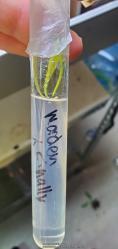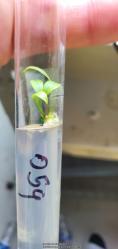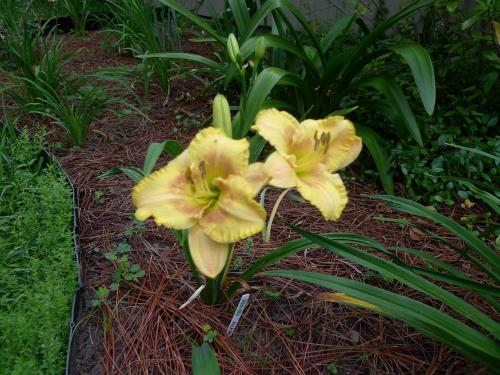nice discussion of the pros and cons (thanks for delving further, Mary! and, i'm assuming the same as Cindy about the pic) ... to my newbie eyes, i am much more enjoying the sorta tropical color gradations in my big box breathless beauty than if it were from what i have seen of the regular stock color ranges, depending on zone, sunlight time, etc (other examples do not begin to enchant me the way this one does).
based on a database note about breathless beauty - that [fan-divided specimens] do not fade in the sun - i would have to say the tissue-culture variety does fade, almost down from purplish-pink with orange-yellow tinges all the way through more orange-based washes, and then to an interesting silvery-gray-and-streaked look by night. but, my no-calif valley sun is truly unrelenting, too. on balance, though, if i saw the two blooming side-by-side, even and perhaps because of the interesting fading habit (new to my eyes morning, noon, and night) i'd pass the 'regular' specimen by and pick up the 'mutated' one

on the other hand, for hybridizing purposes (even for amateur hobbyists like me), its critically useful to identify and work with DLs that have a pedigree, known lineage, confidence in color range and pheno/genotype characteristics, and strength of natural growing/dividing habits (so, a TC "con" for sure), or it can become a very needless shot in the dark. still, i feel a tinge of concern that so many nice newer hybrids, really it seems at times like all of them, are "unknown x unknown," or "something x seedling", appearing as though hiding one's work is now so profitable that it overshadows the ethic to keep the fun and knowledge available to all. naturally, there must be some unknown crosses that occur, and you can tell pretty easily when that's honestly the case

but it all makes me wonder if DLs will soon go the way of fuchsias ... so removed from the common garden/er that even successful hybridizers become co-opted by Suntory whiskey, copyrighted, mass propogated, and rendered sterile before they'll sell only through exclusive higher-end conglomorates ... the gall mite devastation in fuchsias opened the door for suntory to generate a super-resistant line, and pretty much tore the societies apart *sigh*

i guess i'd rather see DLs stay at the big boxes and see some nice varieties taking hold there, than see the fight that may be looming between Suntory and independent hybridizers ...
i think that's what i love most about DLs ... at the moment ... still able to find nice fans divided from known pedigrees that are under 10$, as well as to sometimes happily indulge with an inspiring instant-purchase at big box ... keeps the door open for regular peeps and hobbyists to find something of latest/greatest quality; there's room enough for everyone ... even for those at the top to keep Suntory et al at bay if prices regularly start attracting attention
 Thank Goodness for places like All Things Plants, and the super-helpful hybriders and members who make Daylilies a pleasure for all!
Thank Goodness for places like All Things Plants, and the super-helpful hybriders and members who make Daylilies a pleasure for all!


